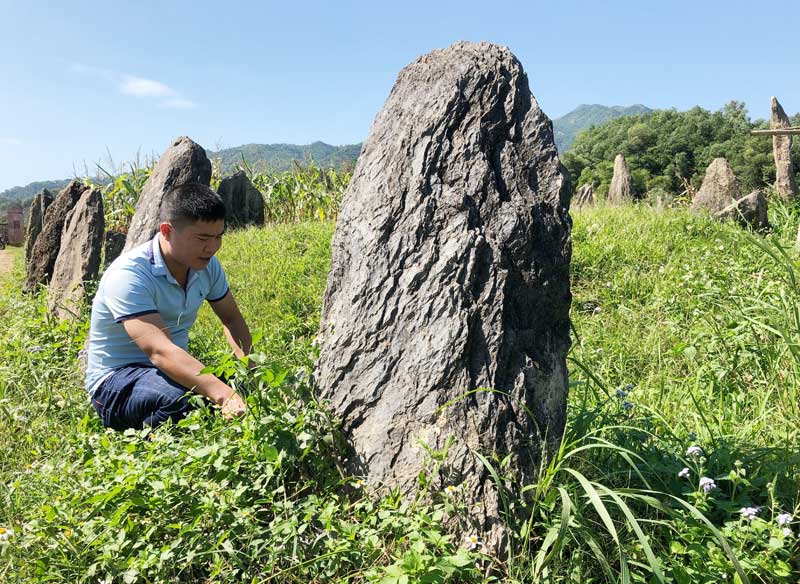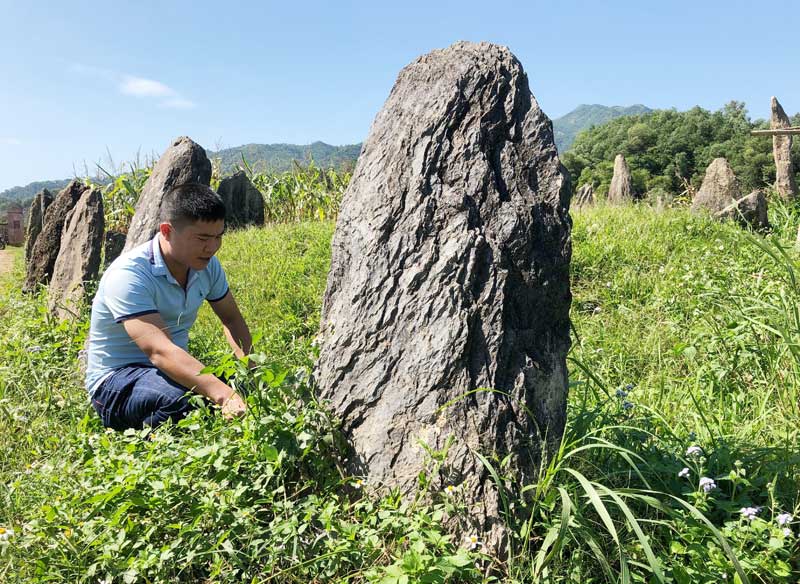
(HBO) - Currently, Kim Boi district has 5 monuments which is ranked national and provincial level. In particular, Dong Thech ancient tomb area (Vinh Dong commune) is a national archaeological relic.

Dong Thech ancient tomb area (Vinh Dong commune) is a national archaeological relic.
Provincial-level historical and cultural
relics include: Chieng communal house (Vinh Dong commune), Boi pagoda (Nam
Thuong commune). Historical revolutionary relics at provincial level: Lap communal house
(Lap Chiengcommune) and Uncle Ho relics visit Kim Boi district Party Committee (Bo town). Kim Boi
district has implemented a lot of solutions to promote the value of monuments in the area.
Over the years, Kim Boi Party Committee,
authorities and people are always interested in the conservation and management
of monuments. As a result, the phenomenon of abandoned relics in the area. The
district is established a district management board.
In all relic communes, a Relic Management
Board has been set up, of which the ancient tomb of Dong Thech in Vinh Dong commune has a
regular custodian and he is entitled to a monthly salary.
The Management Board of relics at the commune
and district level has done well the task of managing and organizing the
rituals taking place at the monument.
In addition, every year, the district reviews
and inventory to discover the degraded relics to coordinate with the Department
of Culture, Sports and Tourism to have plans to repair and renovate the relics.
Besides, the district carried out socializing, mobilizing all resources in the
society to restore and embellish the monument.
Kim Boi district also preserves traditional
festivals to attract tourists. Each relic is associated with a legend, a
traditional festival. Typically, the Chieng communal festival (Vinh Dong
commune) is usually held on the 15th day of the first lunar month. This is an
opportunity for the people to express their respect and gratitude to the kings
and deities, wishing for a favorable year of rain, wind, good crops and happy
houses.
With an increasingly vibrant and widespread emulation movement aimed at building cultured residential areas and cultured families, Yen Thuy District has been making steady progress toward improving both the material and spiritual well-being of its people, while fostering a civilized, prosperous, beautiful, and progressive community.
Once lacking recreational spaces and community facilities, Residential Group 2 in Quynh Lam Ward (Hoa Binh City) has recently received attention for the construction of a new, spacious, and fully equipped cultural house. The project followed the model of state support combined with public contributions in both labor and funding.
The "All people unite to build cultural life" movement, which has been effectively integrated with Kim Boi district’s socio-economic development goals, is fostering a lively spirit of emulation across local residential areas, hamlets, villages, public agencies, and enterprises. In addition, through the initiative, traditional cultural values are being preserved and promoted, while community solidarity and mutual support in poverty reduction and economic development are being strengthened.
A working delegation of the Hoa Binh provincial People’s Committee led by its Permanent Vice Chairman Nguyen Van Toan on June 11 inspected the progress of a project to build the Mo Muong Cultural Heritage Conservation Space linked to tourism services in Hop Phong commune, Cao Phong district.
Born and growing in the heroic land of Muong Dong, Dinh Thi Kieu Dung, a resident in Bo town of Kim Boi district, in her childhood was nurtured by the sweet lullabies of her grandmother and mother. These melodies deeply imprinted on her soul, becoming an inseparable part of her love for her ethnic group's culture. For over 20 years, this love for her hometown has driven Dung to research, collect, and pass down the cultural values of the Muong people to future generations.
In the final days of May, the Ethnic Art Troupe of Hoa Binh Province organized performances to serve the people in remote, mountainous, and particularly disadvantaged areas within the province. These were not just ordinary artistic shows, but they were the meaningful journeys aimed at spreading cultural values, enhancing the spiritual life of the people and contributing to the preservation of ethnic minority cultural identities.



